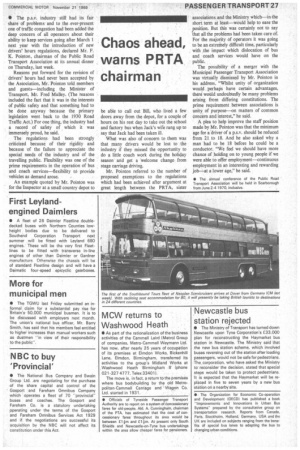Chaos ahead, warns PRTA chairman
Page 29

If you've noticed an error in this article please click here to report it so we can fix it.
• The p.s.v. industry still had its fair share of problems and to the ever-present one of traffic congestion had been added the deep concern of all operators about their ability to keep services going after March 1 next year with the introduction of new drivers' hours regulations, declared Mr. F. K. Pointon, chairman of the Public Road Transport Association at its annual dinner on Thursday, last week.
Reasons put forward for the revision of drivers' hours had never been accepted by the Association, Mr. Pointon told members and guests—including the Minister of Transport, Mr. Fred Mulley. (The reasons included the fact that it was in the interests of public safety and that something had to be done anyway because the primary legislation went back to the 1930 Road Traffic Act) For one thing, the industry had a record of safety of which it was immensely proud, he said.
The regulations had been strongly criticized because of their rigidity and because of the failure to appreciate the special needs of the industry and of the travelling public. Flexibility was one of the prime requirements in the operation of bus and coach services—flexibility to provide vehicles as demand arose.
An example quoted by Mr. Pointon was for the inspector at a small country depot to be able to call out Bill, who lived a few doors away from the depot, for a couple of hours on his rest day to take out the school and factory bus when Jack's wife rang up to say that Jack had been taken ill.
What was also of concern to them was that many drivers would be lost to the industry if they missed the opportunity to do a little coach work during the holiday season and get a welcome change from stage carriage driving.
Mr. Pointon referred to the number of proposed exemptions to the regulations which had been achieved after argument at great length between the PRTA, sister
associations and the Ministry which—in the short term at least—would help to ease the position. But this was certainly not to say 'that all the problems had been taken care of. For the majority of operators it was going to be an extremely difficult time, particularly with the impact which dislocation of bus and coach services would have on the public.
The possibility of a merur with the Municipal Passenger Transport Association was virtually dismissed by Mr. Pointon in his address. "Whilst unity of organization would perhaps have certain advantages, there would undoubtedly be many problems arising from differing constitutions. The prime requirement between associations is unity of purpose—on matters of common concern and interest," he said.
A plea to help improve the staff position made by Mr. Pointon was that the minimum age for a driver of a p.s.v. should be reduced from 21 to 18. And he also asked why a man had to be 18 before he could be a conductor. "We feel we should have more chance of holding on to young people if we were able to offer employment—continuous employment in an interesting and rewarding job—at a lower age," he said.
• The annual conference of the Public Road Transport Association will be held in Scarborough from June 2-4 1970, inclusive.




































































































